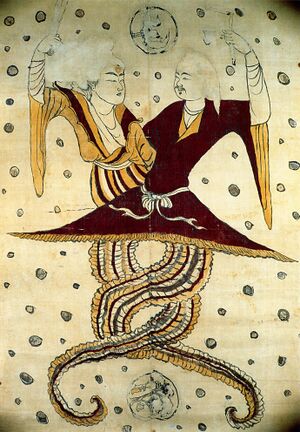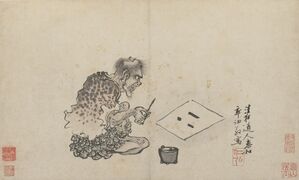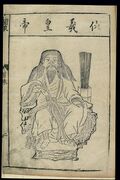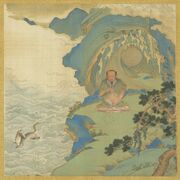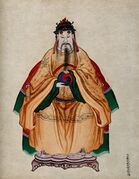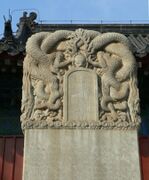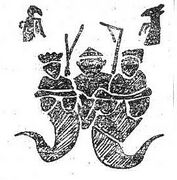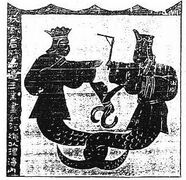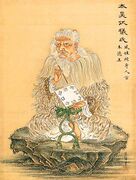فوشي
| ||||||||||||||||||||||||||||||||||
| ||||||||||||||||||||||||||||||||||
في الأساطير الصينية، فوشي Fu Xi أو Fu Hsi (بالصينية: 伏羲; ويـُعرف كذلك باسم پاوشي Paoxi بالصينية: 庖牺 أو 庖犧), في أواسط القرن الثمن والعشرين قبل الميلاد, كان أول السادة الثلاثة الأسطوريين (三皇 sānhuáng) من الصين القديمة. وهو بطل ثقافي يـُنسب إليه اختراع الكتابة، صيد السمك, وصيد الحيوانات بالفخاخ.
فو شي الامبراطور الصيني الذي تولى الحكم في عام 852 ق. م ، وقام بنهضة كبيرة للصين حيث أنه علم الناس بمعاونة زوجه المستنيرة الزواج ، والموسيقى والكتابة والتصوير ، وصيد السمك بالشباك ، وتأنيس الحيوان ، واطعام دود القز للحصول منها على الحرير. وأوصى وهو على فراش الموت أن يخلفه سن نونج.

الأصل
Pangu was said to be the creation god in Chinese mythology. He was a giant sleeping within an egg of chaos. As he awoke, he stood up and divided the sky and the earth. Pangu then died after standing up, and his body turned into rivers, mountains, plants, animals, and everything else in the world, among which is a powerful being known as Huaxu (华胥). Huaxu gave birth to a twin brother and sister, Fuxi and Nüwa. Fuxi and Nüwa are said to be creatures that have faces of human and bodies of snakes.[1]
Fuxi was known as the "original human", and he was said to have been born in the lower-middle reaches of the Yellow River in a place called Chengji (成纪) (possibly modern Lantian, Shaanxi province, or Tianshui, Gansu province).[2]
A possible historical interpretation of the myth is that Huaxu (Fuxi's mother) was a leader during the matriarchal society (ح. 2,600 BC) as early Chinese developed language skill while Fuxi and Nüwa were leaders in the early patriarchal society (ح. 2,600 BC) while Chinese began the marriage rituals.[3] However, the "matriarchal society" is an invention of Communist history, as Marxist theory requires that societies begin as matriarchal, and there is no actual evidence that any such time period ever actually existed in China.
أسطورة الخلق
According to the Classic of Mountains and Seas, Fuxi and Nüwa were the original humans who lived on the mythological Kunlun Mountain (today's Huashan). One day they set up two separated piles of fire, and the fire eventually became one. Under the fire, they decided to become husband and wife. Fuxi and Nüwa used clay to create offspring, and with the divine power they made the clay figures come alive.[2] These clay figures were the earliest human beings. Fuxi and Nüwa were usually recognized by Chinese as two of the Three Sovereigns in the early patriarchal society in China (ح. 2,600 BC), based on the myth about Fuxi establishing marriage ritual in his tribe. The creation of human beings was a symbolic story of having a larger family structure that included the figure of a father.
اكتشاف النار
ثقب الخشب لإشعال النار هي أسطور صينية تروي كيف أمكن للإنسان الأول أكتشاف النار وتقول: كان الانسان البدائي لا يعرف النار ولا يعرف استخدامها ، وكان الظلام يلف كل شئ في الليل.
وتقول الاسطورة ان الها كبيرا اسمه فوشي شعر بالحزن الشديد برؤية الناس على الارض يعيشون بصعوبة، وقرر تعريفهم باستخدام النار ، لذلك، ابرقت الدنيا وارعدت حيث سقط الرعد على الاشجار واشعل النار فيها وامتدت النار لمسافة كبيرة. وكان الناس يشعرون بخوف شديد ، لكن شابا شجاعا اقترب من النار، وشعر بالدفء ، وقال للآخرين بسعادة: اقتربوا! ان النار غير مخيفة ، انها دافئة ومنيرة! حينئذ، وجد الآخرون حيوانات برية مشوية ، فتجمعوا بجانب النار وتمتعوا بلحوم الحيوانات البرية المشوية حيث ادركوا اهمية النار ، فجمعوا الاغصان للحفاظ على توقد النار ، لكن النار خمدت بسبب اهمال الشخص المناوب ، وعانى الناس من جديد من الظلام والبرد.
وتضيف الاسطورة ان الالهفو شي شاهد كل هذا وتراءى للشاب الذى وجد اهمية النار في الحلم وقال له: "هناك دولة سويه مينغ في اقصى الغرب توجد فيها شعلات النار ، يمكنك الذهاب الى هناك للحصول على الشعلات" ، واستيقظ الشاب وقرر الذهاب الى دولة سويه مينغ للبحث عن النار.
وصل الشاب الى دولة سويه مينغ بعد التغلب على صعوبات كثيرة ، لكنه لم يجد شمسا، ولا ليلا ولا نهارا، ووجد الظلام يلف كل مكان، ولا توجد نار على الاطلاق. وشعر الشاب بخيبة الامل واستراح جالسا تحت شجرة تدعى "سوى مو" ، وفجأة رأى عدة عصافير تنقر الشجرة بحثا عن طعام وخلال نقرها كانت شرارات تتطاير من الجذع الصلب، لذلك، اسرع الشاب الى جمع بعض الاغصان الحادة واخذ يحاول ثقب جذع الشجرة كما فعلت العصافير، لم يتطاير الشرار في البداية لكن الشاب واصل عمله مثابرا الى ان ظهرت النار اخيرا، ونزلت دموع السعادة من عيني الشاب.
وعاد الشاب الى مسقط رأسه بالنار التى لن تخمد، عاد بوسيلة اشعال النار بثقب الخشب، وشكر الناس كثيرا وجعلوه زعيما لهم واطلقوا عليه اسم "سوى رن" يعنى "مشعل النار".
الأهمية الاجتماعية
On one of the columns of the Fuxi Temple in Gansu Province, the following couplet describes Fuxi's importance: "Among the three primogenitors of Huaxia civilization, Fu Xi in Huaiyang Country ranks first."[2] During the time of his predecessor Nüwa, society was matriarchal.
古之時未有三綱、六紀,民人但知其母,不知其父,能覆前而不能覆後,臥之言去言去,起之吁吁,饑即求食,飽即棄余,茹毛飲血而衣皮葦。於是伏羲仰觀象於天,俯察法於地,因夫婦正五行,始定人道,畫八卦以治下。
In the beginning there was as yet no moral or social order. Men knew their mothers only, not their fathers. When hungry, they searched for food; when satisfied, they threw away the remnants. They devoured their food hide and hair, drank the blood, and clad themselves in skins and rushes. Then came Fu Xi and looked upward and contemplated the images in the heavens, and looked downward and contemplated the occurrences on earth. He united man and wife, regulated the five stages of change, and laid down the laws of humanity. He devised the eight trigrams, in order to gain mastery over the world.
— Ban Gu، Bai Hu Tongyi[4]
Fuxi taught his subjects to cook, to fish with nets, and to hunt with weapons made of bone, wood, or bamboo. He instituted marriage and offered the first open-air sacrifices to heaven. A stone tablet, dated AD 160, shows Fuxi with Nüwa.
Traditionally, Fuxi is considered the originator of the I Ching, which work is attributed to his reading of the He Map (or the Yellow River Map). According to this tradition, Fuxi had the arrangement of the trigrams of the I Ching revealed to him in the markings on the back of a mythical dragon horse (sometimes said to be a tortoise) that emerged from the Luo River. This arrangement precedes the compilation of the I Ching during the Zhou dynasty. This discovery is said to have been the origin of calligraphy. Fuxi is also credited with the invention of the Guqin musical instrument, though credit for this is also given to Shennong and Yellow Emperor.
The Figurists viewed Fuxi as Enoch, the Biblical patriarch.
وفاته
Fuxi is said to have lived for 197 years altogether and died at a place called Chen (modern Huaiyang, Henan), where a monument to him can still be found and visited as a tourist attraction.[2]
معرض
Tang dynasty painting of Fuxi (right) and Nüwa (left) unearthed in the Astana Cemetery, Xinjiang
Seated portrait depicting Fuxi, painted by Ma Lin of the Song dynasty
Painting of Fuxi looking at a trigram sketch, painted by Guo Xu of the Ming dynasty
Emperor Fuxi, woodcut print by Gan Bozong of the Tang dynasty
Fuxi, painted by Qiu Ying of the Ming dynasty, as depicted in Orthodoxy of Rule Through the Ages
Chinese emperor Fuxi, wearing a traditional costume, holding the yin yang symbol, 19th century
انظر أيضاً
المصادر والمراجع والوصلات الخارجية والمأثورات
ملاحظات
المصادر
ديورانت, ول; ديورانت, أرييل. قصة الحضارة. ترجمة بقيادة زكي نجيب محمود.
الهامش
- ^ Millidge, Judith (1999). Chinese Gods and Myths (in الإنجليزية). Chartwell Books. ISBN 978-0-7858-1078-0.
- ^ أ ب ت ث Worshiping the Three Sage Kings and Five Virtuous Emperors - The Imperial Temple of Emperors of Successive Dynasties in Beijing. Beijing: Foreign Language Press. 2007. ISBN 978-7-119-04635-8.
- ^ Cotterell, Arthur (1979). A Dictionary of World Mythology (in الإنجليزية). Book Club Associates. ISBN 978-0-19-217747-6.
- ^ Wilhelm, Richard; Baines, Cary F. (1967). I Ching.
فوشي
| ||
| ألقاب ملكية | ||
|---|---|---|
| سبقه سوي رن Suiren |
امبراطور الصين ح 2800 ق.م. - 2737 ق.م. |
تبعه شن نونگ Shennong |
- Articles containing صينية-language text
- حضارة صينية
- آلهة صينية
- مخترعو نظم كتابة
- گوتشين
- 29th-century BC rulers
- 28th-century BC people
- Three Sovereigns and Five Emperors
- Chinese emperors
- Chinese gods
- History of ancient China
- Legendary rulers
- Mythological human hybrids
- Snake gods
- Creator gods
- Deities in Chinese folk religion
